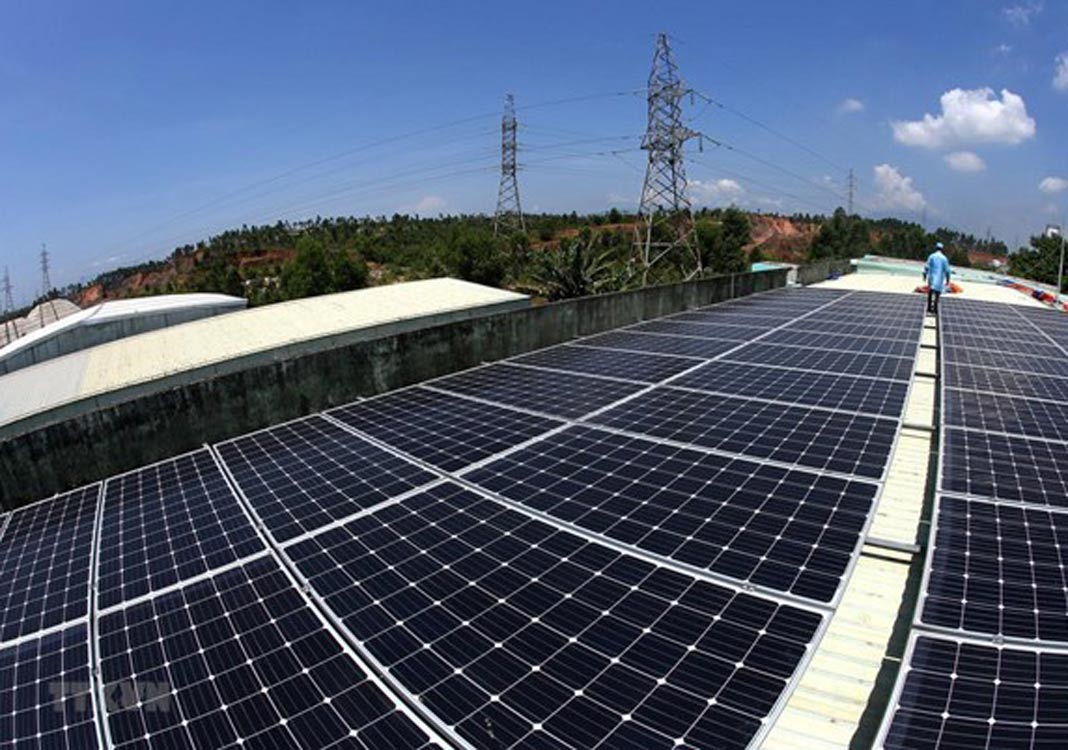HCMC – While the renewable energy industry found favor among many foreign firms and foreign investment funds in the past, now, local players have become increasingly active, with several Vietnamese energy firms injecting more money into renewable energy projects, especially those related to solar energy, to secure preferential pricing and tax incentives from the Government.
Bamboo Capital JSC (BCG) is a new player that is keen on the Vietnamese renewable energy market and the firm has paid billions of U.S. dollars over the past two years.
BCG has, so far, made investments worth up to VND30 trillion (US$1.28 billion) in 10 solar power projects through its subsidiary BCG Energy, which was founded in 2017.
BCG Energy has invested some VND15 trillion (US$642 million) in six projects in the Mekong Delta province of Long An and roughly VND9 trillion (US$385 million) in three projects in the neighboring province of Ben Tre.
Late last month, Clean Energy Vision Development JSC, a subsidiary of BCG Energy, broke ground for a 330-megawatt solar power plant, which requires a total investment of VND6.2 trillion (US$265 million) in the south-central province of Binh Dinh.
As consumption is predicted to grow faster than that of new power supplies, Vietnam will face a serious power crunch, noted Pham Minh Tuan, general director of both BCG Energy and Clean Energy Vision Development JSC, at the groundbreaking ceremony.
There will be a shortage of some 20 billion kilowatt hours of electricity, which will double by 2025. “In recent years, BCG Energy has focused on the research and implementation of renewable energy projects to create an alternative supply,” stated Tuan.
He added that the firm has been working closely with leading partners in the solar energy industry over technology solutions, engineering structures, construction options, environmental solutions and the analysis and research of local energy demand.
A top official at the Refrigeration Electrical Engineering Corporation (REE) told shareholders at a recent meeting that that firm is focusing on renewable energy this year.
REE is carrying out a wind power project whose capacity will double later this year. The firm is on the lookout for a contractor so that construction work on the project can begin in August this year and the plant will be up and running by the end of next year.
The company plans to embark on a rooftop solar power project as well.
REE Chairwoman Nguyen Thi Mai Thanh said the energy industry remains a basic sector rather than a high risk-high return one, so the investment in the industry is geared to the sustainable growth.
Stating that REE does not intend to chase “hot” revenues and profits, she stressed that solar power projects are expected to have a slightly faster capital recovery rate, which takes roughly seven to eight years.
Although the firm revealed its strategy for renewable energy, its investment plan and scale remain undisclosed.
Meanwhile, the Thien Tan Group has detailed its investment plan for a US$2-billion solar power project in the south-central province of Binh Thuan.
The group established its foothold in the renewable energy industry in 2017 as it spent VND1.4 trillion on the construction of the 50-megawatt Thien Tan Solar Ninh Thuan plant.
After the plant was completed and connected to the national power grid in March 2020, the firm unveiled its new plan.
The firm noted that the plant was part of the first phase of its major solar power project in Binh Thuan Province. Work on the second phase will begin once the firm receives the necessary approvals from the provincial government and other state agencies.
Covering around 1,400 hectares, the plant will turn out a total capacity of 1,000 megawatts, and require an investment of some US$2 billion.
Government incentives
In April 2020, Prime Minister Nguyen Xuan Phuc issued a new mechanism to encourage investments in the country’s solar energy sector and remove the bottlenecks facing electricity prices over the past few months, which came into effect from May 22 and will end on December 31, 2020.
The highest buying price of electricity is set at VND1,943 per kilowatt hour (kWh), equivalent to 8.38 U.S. cents per kWh.
Meanwhile, the feed-in tariff, referring to the price of electricity sold to the national grid, for floating solar power projects is at VND1,783 or 7.69 U.S. cents per kWh.
The respective feed-in tariffs for ground-mounted and rooftop solar power systems are VND1,644 (7.09 U.S. cents) and VND1,943 (8.38 U.S. cents) per kWh.
The December 31 deadline poses a major obstacle to solar energy investors, and small companies are finding it challenging to secure enough equipment to build their plants.
The current devices are only able to generate several dozens of kWh. In case of higher electricity volumes, they have to be ordered from abroad and these deliveries take roughly 20 to 30 days.
Moreover, the coronavirus pandemic has wreaked havoc on supply chains, so the delivery could take even longer.
Nguyen Tuan Anh, director of Nam Kha Solar Power Co., Ltd., said that in an attempt to secure preferential prices, his company is allocating its resources to implement rooftop solar power projects before the deadline comes.
Major firms, such as BCG, Thien Tan and REE, are more likely to meet the deadline thanks to their financial and technological advantages.
“Right now, we have to operate at full capacity to build and complete (the plant), and connect it to the [national] electrical grid by the end of this year to enjoy preferential prices,” said REE Chairwoman Nguyen Thi Mai Thanh.
By Viet Dung









